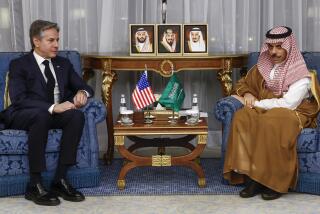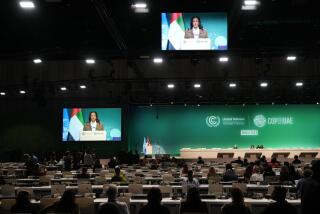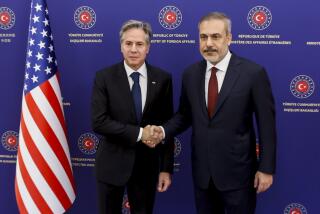Rice, in Mideast, Meets Skeptics
CAIRO — Secretary of State Condoleezza Rice, touring the Middle East in an attempt to build support for U.S. goals and allies, found herself Tuesday on the defensive about the Bush administration’s search for partnerships and its efforts for democratic reform.
Meeting in Cairo with ministers of eight moderate Arab regimes, Rice was questioned on whether her desire to work with the countries masked an American desire to line up allies against the growing power of Iran.
The Egyptian foreign minister and dubious local media asked whether President Bush’s campaign of democratic reform was nothing short of meddling by a country that doesn’t accept election results it doesn’t like.
Bush dispatched Rice to the Middle East at a time when, in the wake of the war in Lebanon, European and Arab countries, among others, are clamoring again for progress in the ArabIsraeli dispute. But as Rice arrived in Cairo on the second day of a weeklong trip, it was apparent that many in the region feared the effort was a veiled attempt to build a new “coalition of the willing” to stand up to Iran, like that employed in the U.S.-led invasion of Iraq in 2003.
Administration officials have faced tough questions in the region for some time. Still, the tone Tuesday was another sign that Washington confronts a stiffer challenge rebuilding ties in the aftermath of the war in Lebanon, which many here contend the American government was unwilling to stop.
Rice, in a meeting with the local media, insisted that “this is not a meeting or a coalition against anyone.”
Ahmed Aboul Gheit, the Egyptian foreign minister, made clear his government’s view that although Cairo had been a key target of U.S. efforts for democratic reform, it was capable of advancing at its own speed.
Aboul Gheit challenged Rice to stay in Egypt a month to witness for herself the country’s eagerness for development.
“Not everything is done in haste ... and not everything is done in one day,” he said. “But we will move ... we will be there.”
Rice was asked at the evening news conference about widespread reports that the United States was secretly supporting the choice of Gamal Mubarak to succeed his father, longtime President Hosni Mubarak.
She insisted that the United States was not involved in the decision.
“It is absolutely going to be up to the people who is going to be the president of Egypt,” Rice said.
The secretary of State said the administration’s goal in funding nongovernmental programs for building democratic institutions was “not to interfere in choices Egyptians make, but to help civil society develop the capability to give Egyptians choices.”
“The United States is going to stand for certain values,” she said.
“We always have and we always will -- and it is not a matter of interference in Egypt’s internal affairs. How Egypt conducts its internal affairs will, of course, be up to Egyptians.”
Reporters questioned whether U.S. aid to nongovernmental organizations wasn’t actually interference.
Rice was also asked whether the United States did, indeed, favor democratic outcomes, considering that it had worked to halt aid to the Hamas-led Palestinian Authority government elected this year.
In response to another question, Rice made a slight change in the administration’s vocabulary. She said she preferred “the future Middle East” to the phrase “the new Middle East,” which has become controversial because it suggests U.S.-engineered change.
Bringing back an important word from Bush’s 2000 election campaign, she said the United States intended to be “humble” in the way it encouraged countries to change.
During Rice’s visit to Cairo and a stop Monday evening in Jidda, Saudi Arabia, it was clear that American allies in the region had greater ambitions for a renewed Israeli-Palestinian peace effort than the administration did.
U.S. officials have said that the most they hope for now is limited progress. Bush said last week that the United States did not intend to impose a settlement on the Palestinians and Israelis.
But Aboul Gheit and Saudi Foreign Minister Saud al Faisal made it clear that they wanted major steps to be taken swiftly to move the parties toward an eventual two-state solution.
“Ever since the problem arose of Palestinian-Israeli conflict, the region has been destabilized,” Saud said.
“Like a disease on the body, it calls for other diseases to attack that weakened body. And, therefore, we think it’s a core problem.”
*
More to Read
Sign up for Essential California
The most important California stories and recommendations in your inbox every morning.
You may occasionally receive promotional content from the Los Angeles Times.











